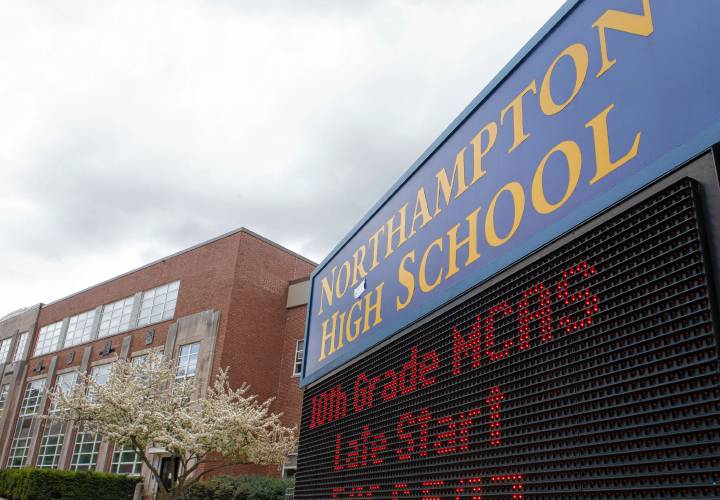Guest column: Serving educational needs shouldn’t be ‘aspirational’

STAFF FILE PHOTO STAFF FILE PHOTO
| Published: 05-06-2024 1:46 PM |
The School Committee recently passed a level services budget requiring an increase in its share of the city’s budget. My colleagues and I voted 8-1 — with the mayor abstaining — to pass this budget. We did so because we understand the challenges facing our schools and the dire impact the cuts the mayor is demanding would have on our children, staff, and city.
At root, this is a disagreement between an elected School Committee and an elected mayor about the priority of the Northampton Public Schools in the budgeting process. It is my hope that the City Council and public will consider our proposal as an alternative to the deep layoffs in the mayor’s budget.
We are calling for democratizing the process through collaboration among our elected leaders to craft a budget that best represents our community’s values within the constraints of limited resources. Instead of one person largely dictating the spending priorities of the entire city, our representative bodies would share in the challenge.
This approach has been met with scorn by those who favor the “strong mayor” charter. For them, any deviation from the so-called fiscal stability plan and mayoral supremacy means certain doom, and they seek to scare the public into believing we won’t have any other city services if we increase education funding.
These fear tactics are crashing into a wave of residents who are asking difficult questions that the Chicken Littles cannot answer. At numerous School Committee meetings, I have asked the mayor to give us her argument as to why laying off teachers is the right way to balance the city’s budget. She has yet to make an argument, instead reciting that the fiscal stability plan determines department budgets and that she supports a 4% increase.
I am very much in favor of prudent fiscal management — but it has to adequately meet our most pressing needs and be regularly revisited so that we can adapt to changing circumstances. The mayor’s “fiscal stability plan,” by contrast, is set to autopilot going nowhere.
The uncomfortable truth is: For decades, the city of Northampton underfunded its public schools and largely balanced the budget on the backs of teachers and children. As a columnist recently pointed out, there were many years of 0% increases to the schools, which resulted in cuts after cuts to deal with increasing costs [“How to make sense of Northampton’s school budget,” April 20]. This was terrible.
The same columnist also celebrated the 3% average yearly increases for the Northampton Public Schools since the creation of the fiscal stability plan. Clearly, an improvement over 0%; but after years of underinvestment, things improved, but not nearly enough. Suggesting either the mayor’s cuts or worse “misery” as our only options is a false choice.
Article continues after...
Yesterday's Most Read Articles
Over the last 10 years NPS added staff to meet increased student needs and special education requirements, negotiated two reasonable contracts with the unions to address the fact that our teachers are still among some of the lowest paid in the state, and suffered the effects of the pandemic.
The increasing needs were papered over in five of the last six years by subsidizing the operating budget with a reserve of school choice money. The issue is not that NPS “strayed from the plan” — a weird claim, as the mayor is chair of the School Committee — but that its needs increased and its share of revenue did not increase adequately. We need a large increase this year to make up for the compounded effect of years of underinvestment.
This isn’t the fault of our educators or children.
This moment calls for an intentional realignment of the share NPS receives of city revenues, which may or may not mean making tough choices — but the alternative is to significantly wound our district, the impact of which would fall disproportionately on the most marginalized students and families. Our values conflict with sustaining this systemic inequity and with the implied expectation that a largely female workforce should subsidize our budget through low pay, a freeze on negotiated wage increases, and uncompensated care work.
I was particularly bemused to see the mayor refer to a level services budget as “aspirational.” Paradoxically, how would she describe the new divisions and departments the city has recently created, or the millions of city dollars that will go to Picture Main Street and the Resilience Hub, or stockpiling millions in reserves for the greatest bond rating? Are these not aspirational? In municipal governance, some things are far less novel and viewed as essential: roads, sidewalks, and certainly public schools.
This budget season reminded me how wonderful our community is and how much we value public education. The residents of our city are remarkable, and they expect their elected officials to align our budget with our values, making prudent use of our resources.
Absent a shift in the mayor’s position, it is now the responsibility of the City Council to save our schools from austerity. I will support them in this work, and remain grateful for all the residents who are fighting for our schools, our city, and our local democracy. Another budget is possible. We can do this.
Michael Stein is a Northampton School Committee member from Ward 4.

 Scott Brown: Road to ruin for Northampton schools
Scott Brown: Road to ruin for Northampton schools Columnist Rev. Andrea Ayvazian: Divided city? Pride brought us together
Columnist Rev. Andrea Ayvazian: Divided city? Pride brought us together
 Margaret Mastrangelo: Vote ‘yes’ for Hadley firetruck
Margaret Mastrangelo: Vote ‘yes’ for Hadley firetruck
